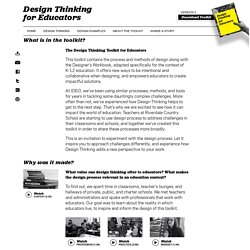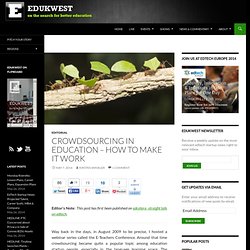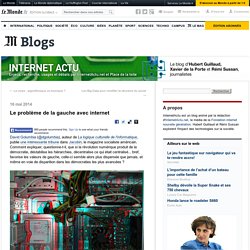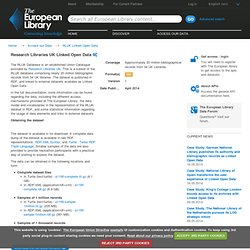

About the Toolkit « Design Thinking for Educators. The Design Thinking Toolkit for Educators This toolkit contains the process and methods of design along with the Designer’s Workbook, adapted specifically for the context of K-12 education.

It offers new ways to be intentional and collaborative when designing, and empowers educators to create impactful solutions. At IDEO, we’ve been using similar processes, methods, and tools for years in tackling some dauntingly complex challenges. More often than not, we’ve experienced how Design Thinking helps to get to the next step. That’s why we are excited to see how it can impact the world of education.
This is an invitation to experiment with the design process. Crowdsourcing in Education - How to make it work. Editor’s Note: This post has first been published on edcetera -straight talk on edtech.

Way back in the days, in August 2009 to be precise, I hosted a webinar series called the E-Teachers Conference. Around that time crowdsourcing became quite a popular topic among education startup people, especially in the language learning space. The reasoning behind that trend essentially was: if Wikipedia can do it, so can we. Most notably Livemocha, which used to be the leader of the pack at that time, crowdsourced nearly all of its freely accessible language courses from its global community. While this enabled Livemocha to add new language options at a rapid pace, it also showed the flaws of such an approach: the localizations were mediocre at best. Who should use Crowdsourcing If you aim for quality, which is probably a good idea in all things education, crowdsourcing is a fairly complex task to set up and manage.
Www.revistacomunicar.com/index.php?contenido=detalles&numero=42&articulo=42-2014-05. Media and Information Literacy. 21 Brilliant Resources for Up-skilling Learning Designers. Le problème de la gauche avec internet. David Golumbia (@dgolumbia), auteur de La logique culturelle de l'informatique, publie une intéressante tribune dans Jacobin, le magazine socialiste américain.

Comment expliquer, questionne-t-il, que si la révolution numérique produit de la démocratie, déstabilise les hiérarchies, décentralise ce qui était centralisé... bref, favorise les valeurs de gauche, celle-ci semble alors plus dispersée que jamais, et même en voie de disparition dans les démocraties les plus avancées ? Image : l'intérieur d'un ordinateur en 3D par Fidelis. Quelle est la nature libératoire de l'informatique ? Pour David Golumbia, la raison est à chercher dans le cyber-libertarianisme. Ce terme introduit dans les années 90 par les théoriciens des médias Richard Barbrook et Andy Cameron, auteurs de "l'idéologie californienne" (Wikipédia, voir sa traduction en français), l'ont utilisé pour décrire le fonctionnement de la Silicon Valley.
Comment le solutionnisme sape les fondements mêmes de l'engagement Hubert Guillaud.
Apuntes digitales. Veille informationnelle. RLUK Linked Open Data. The RLUK Database is an established Union Catalogue provided by Research Libraries UK.

This is a subset of the RLUK database comprising nearly 20 million bibliographic records from 34 UK libraries. The dataset is published in RDF, and linked to external datasets available as Linked Open Data. In the full documentation, more information can be found regarding the data, including the different access mechanisms provided at The European Library, the data model and vocabularies in the representation of the RLUK dataset in RDF, and some statistical information regarding the usage of data elements and links to external datasets. Obtaining the dataset The dataset is available in for download. The data can be obtained in the following locations and form: Read 15 Free eBooks on New Media Studies & the Digital Humanities. OCW Consortium Toolkit by OpenCourseWare Consortium. Onlinetools4learning [licensed for non-commercial use only] / List of Online Tools. Top 100 Tools for Learning 2013 This is a collaborative wiki for Bradford College Tutors.
![onlinetools4learning [licensed for non-commercial use only] / List of Online Tools](http://cdn.pearltrees.com/s/pic/th/onlinetools4learning-84595174)
These online tools for learning, teaching and assessment are advertised in the Bradford College Email. If you have a favourite Web 2.0 tool which you are using successfully to support you in your teaching then feel free to join this space and share your experience and knowledge. For more information on technology for staff and learners at Bradford College why not follow @LearningTech4u Do you recognise any of these tools? It is more or less impossible to "pigeon-hole" software into just one main function as each of the tools below have various characteristics which facilitate teaching, learning and assessment.
This table offers attempts to categorise some of the tools in List of Online Tools4Learning as the Table of Contents (in alphabetical order) is growing and becoming more cumbersome. Animoto Link: Description: Create videos and slideshows easily with a polished wrap around/theme. Audioboo. Videos by topic: TECHNOLOGY.